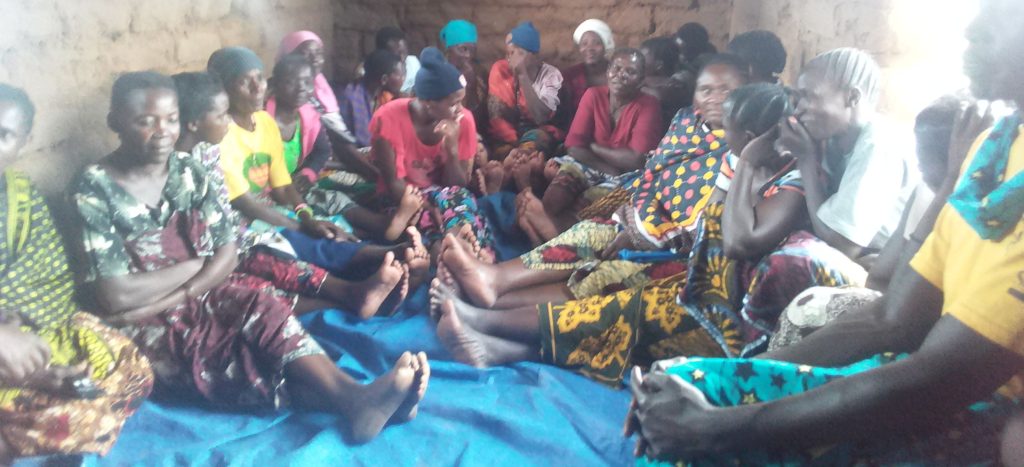Newsletters
Moving-on Project May 2018

Tanzania 38
Busega Scotland currently has eight students out from college on
practical placements and I had the good fortune to be able to visitthem all!
The students had such enthusiasm and pride in their work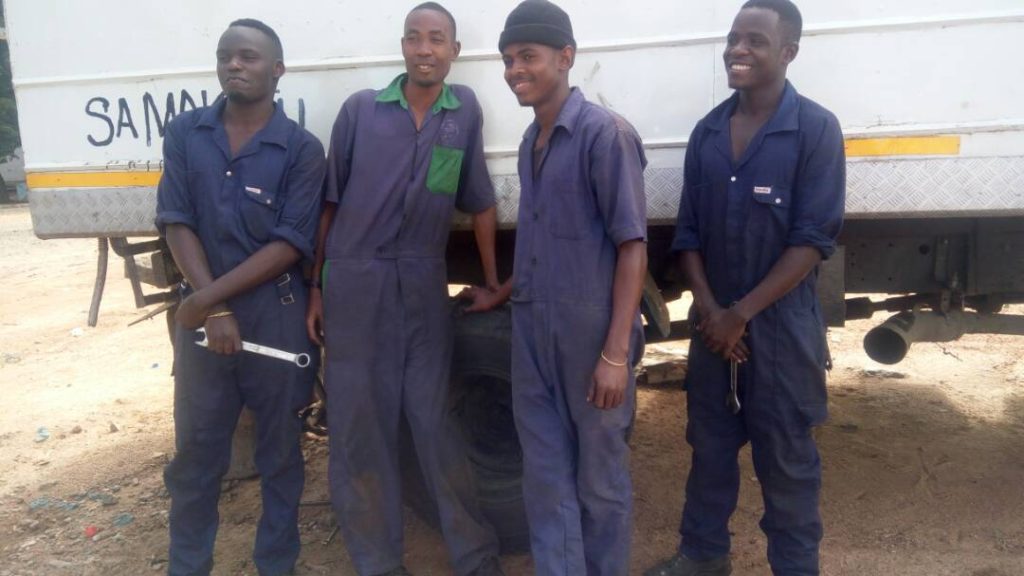
and this was recognised by all their placement supervisors who spoke
very positively about the work that the young people were doing. I
visited four very different mechanic’s workshops, as well as the
electricity supply company, and was impressed with the range of work
that the young people were engaged in.
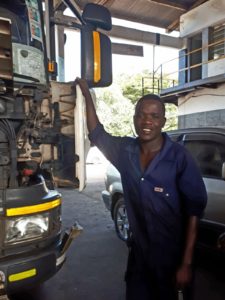
The “garages” are very different. Enosi and Hasan are working at the
Nile Perch Fish Factory Garage maintaining their feet of vehicles. Their
transport manager explained that they take students from 5 colleges
across Tanzania, not just from Mwanza. They are very conscious of
health and safety and limited the students to 6 at any one time. I was
introduced to their chief mechanic and also their apprentice tutor
who showed me the work going on, after providing me with a hard
hat! It made me look a little taller standing next to Enosi!
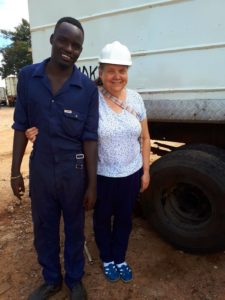
There is a lot of hard physical labour in Tanzanian garages but this place was well equipped.
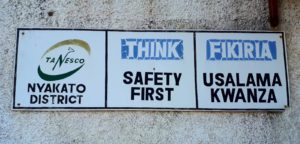
Tanzania Electricity Supply Company
Monica was working at the main electricity supply depot. There are 4 gangs of 8 workmen plus student electricians
sent out into Mwanza each day. The gangs may be installing or reading electricity meters or connecting new
customers, dealing with breakdowns or customer issues or extending the supply network.
Each gang has a vehicle, equipment and a foreman. On the day I visited, the gang leader was one of Gadlord Deuli’s
friends and a former neighbour. Mr Deuli knows people everywhere and it is invaluable when working in Mwanza.
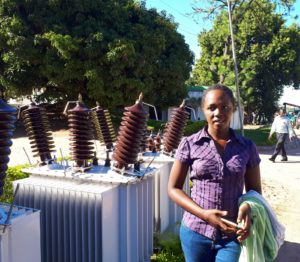
The gang leader said to us, ‘Don’t worry. We take care of Monica as if she were my daughter’. I asked her how she felt
about working with so many men but she said it was not a problem. She was just a worker like everyone else. Her
placement supervisor reported that she was a good worker and was learning a lot with them.
Temesa Government Garage
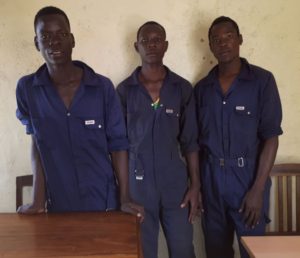
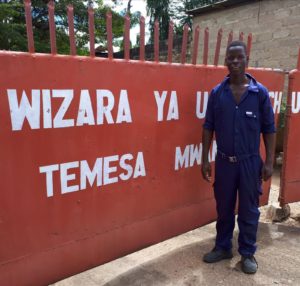
Geoffrey, Lukondya and Dotto were working at a government garage where the engines for the local ferry boats and
government vehicles are maintained and repaired. They hope that a good report on their placement from the
government garage will enhance their CV and help them find work once they qualify. This garage can only employ temporary workers but does employ students who have worked with them.
The place was busy with all three inspection pits in use and groups of mechanics and students working on different
jobs. Our boys had been changing break shoes before we arrived. In this garage they begin work at 8am and finish at
3pm but that is the theory!
I know that with the approaching the May Day holiday there were a lot of vehicles to prepare and the boys did not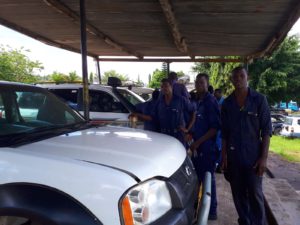
reach home until after 8pm, meaning a 12 hour day for them. Like any garage there are busy and not so busy days.
Again, there was a range of vehicles as well as the ferry engines and workshops for welding and metal fabrication.
When spare parts cannot be found they have to make them themselves. Our boys had not done any welding but
that opportunity is available to them and again I was pleased to see full safety kit. I have in the past seen young men welding in a street garage wearing nothing more than sunglasses for protection.
Saba Saba Garage
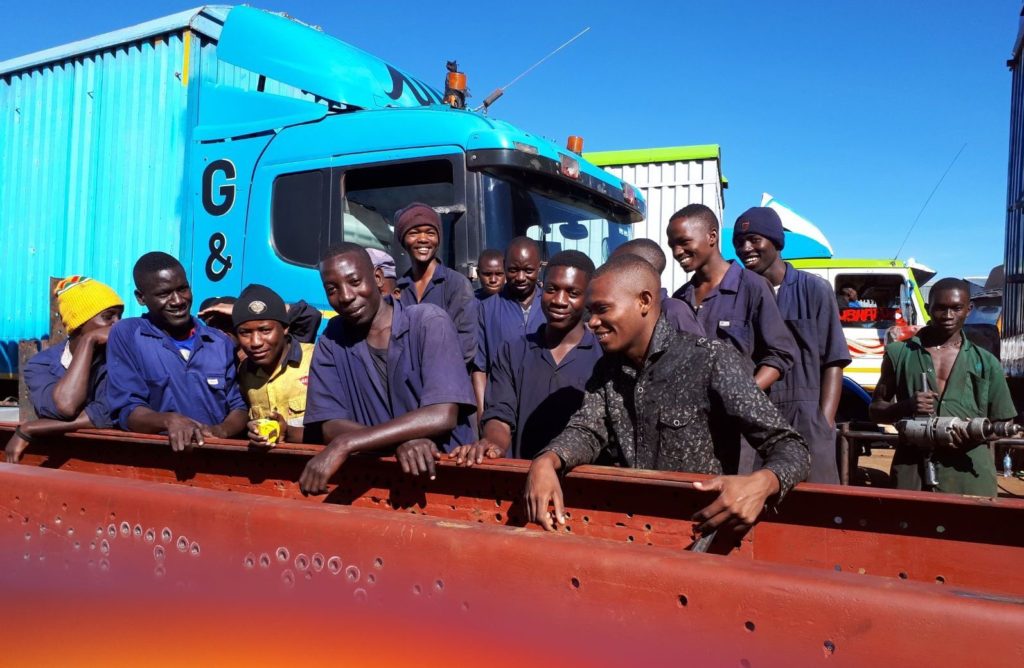
The private garage at Saba Saba looked chaotic when I first arrived however it proved to be a secret gem. Masibuka
is here with other students from Nyakato College.
The person in charge, Mgowisa Mjombi, is passionate about
teaching young men and they reported how well he matched
theory to practice. He showed us round the site and picked out a
student at each stop to explain what was going on and tell methe name of all the engine parts they were working on. All this
was done in English. There was a blackboard in the yard and I was shown some of the students work. Including detailed drawings of parts of engines and how everything connected. The atmosphere was business like with the staff and students working well together. The students reported that the “boss” could fix anything. He was supported in teaching by other permanent staff.
Institute of Medical Research Garage, Bwiru
George is in third year at Kalwande College and we remember his 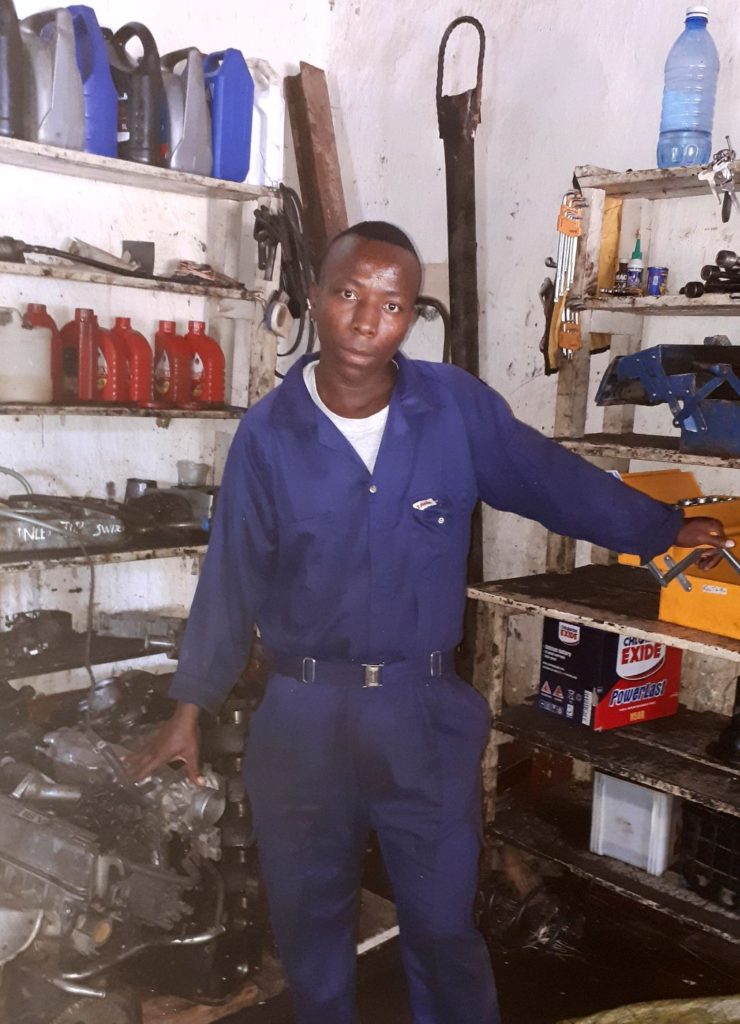
excitement in his first year showing us around the college
workshop. He is always happy when he is working with oily hands
inside an engine. Nothing has changed and he had that same
excitement showing me his placement workplace and introducing
me to his colleagues. He is one of three student mechanics at the
garage, which maintains the vehicles of the Institute of Medical
Research
When we arrived at the garage, he was out
with his supervisor dealing with a broken down
vehicle a few miles away but they soon
returned.
George loves tools and that was the first thing he
showed me, explaining what they were for. He
told me the practical work at his college was very
good but that they did not have enough tools.
There has been a lot of rain in Tanzania recently
and the garage yard was muddy to work in. There
is a hard standing area with a workshop and 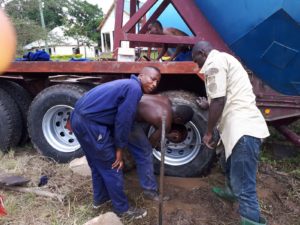
inspection pit, but this tanker needed a complete
wheel change out in the open area. George
clearly felt “at home” with the other workers.
Before leaving George made a plea for his college.
Could we fund more tools? Busega Scotland’s
Mwanza volunteers and fundraisers have already
supplied the students with individual tool kits but
we learnt that they are sharing their tools with all
the other students in college, as many have none. Carrying tools from the UK is not a real option and we are constantly looking for corporate and other sponsors to make things happen in Tanzania. We need money to buy things locally. We have made no promises but would like to help. The mechanics will also need to learn to drive to improve their employment chances once they finish their courses.
The young men are doing well and we received the good news that all the third year Kalwande students were awarded their Vocational Course 1 Certificate following the national exams at the end of last year. This shows that
they passed the first level of the mechanics qualification, which combines their practical placement marks with their
college theory in Mechanical Engineering. Our students are the fortunate ones. We heard from their teacher that ten
students were not presented for the exam as they failed to pay their course fees. Life here is brutal at times.
Nyakato College
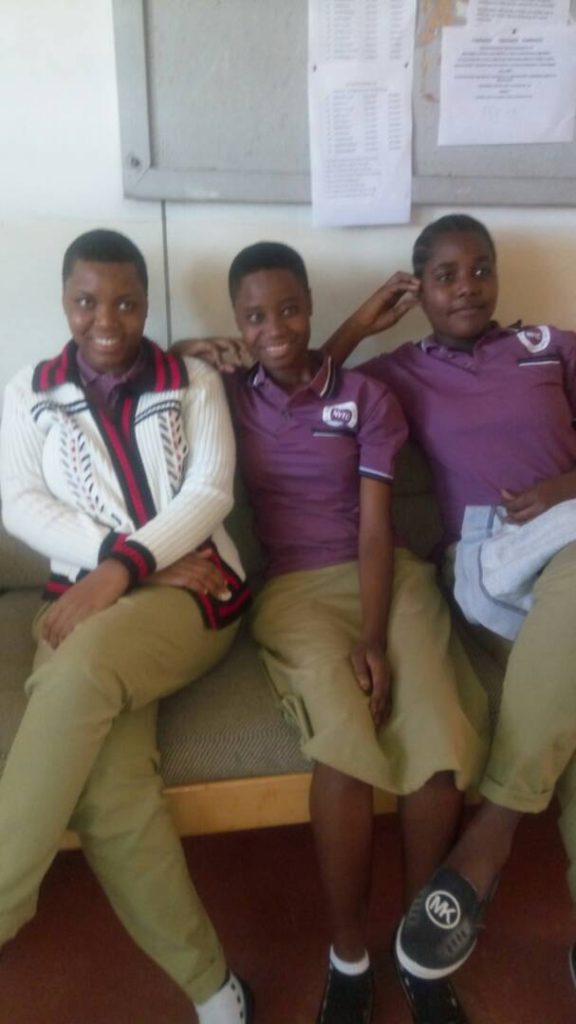
I visited Nyakato College where our first year students were taking part in a computer day. The Principal explained
they have 13 working computers for 140 students. Time in the computer lab is very limited, especially as students
following computing courses have priority. We have found such underfunding wherever we go.
Tanzanian girls can be very shy. It is a cultural thing as
they are expected to be quiet and respectful to their
elders and men in particular. I usually have an
interpreter with me to help with translation and
general communication but I was alone with them.
This was wonderful! The girls were forced to speak in
English with me and I discovered that we could
manage. We laughed a lot as we tried to understand
each other and it was good to have that connection.
They are missing Mayega but enjoying college and
making friends. As you would expect it is their friends
at Mayega they were missing most and they were very
happy when I showed them some recent
photographs. They said how happy they were to see
water flowing at the Children’s Centre
The girls have moved from a rather dark and dismal boarding house on the college campus to a better newly painted dormitory. They like the college matron who looks after all the girls and said that they could go to her with any problems. The principal informed me
that the girls were working hard and were a credit to Mayega.
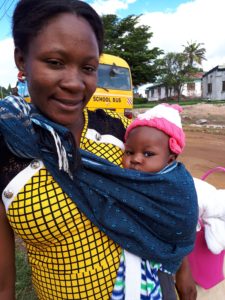 The domestic electrical teacher, Cecelia, has just returned from the standard three months maternity leave after the birth of Johnstone.
The domestic electrical teacher, Cecelia, has just returned from the standard three months maternity leave after the birth of Johnstone.
The baby accompanies her to work, with a younger relative who
looks after him and brings him to mum when he needs to be fed.
Christina is our youngest student and she attends Nyakato College in the afternoons but I did manageto catch up with her teacher. He said that despite her age she was managing to keep up with the average students in the class.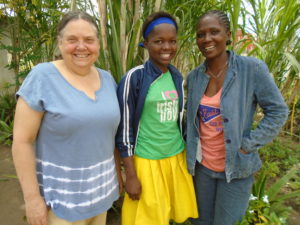 The transition to living with less supervision in the city community rather than at the
The transition to living with less supervision in the city community rather than at the
Children’s Centre has not been without problems and Christina has spent too much time watching TV at a
local café. You can see the attraction for a young person who has grown up without TV. We sentChristina to Mayega last Saturday, travelling with ourAssistant Project Leader.
Young Tanzanians will often say what they think you want to hear rather than give their opinion on something. We decided that having time to talk to Matron was the best way to seek Christina’s opinion on her future and identify any problems she was having settling in Mwanza.She will finish her first 6 months introductory course in tailoring at the end of June and we are exploring options forher, including continuing to develop her tailoring skills at the college. Meanwhile we have made an arrangement with a local tailoring business to allow Christina to work with them every morning to get more practical experience.This will structure her day better as well as help to develop her skills.
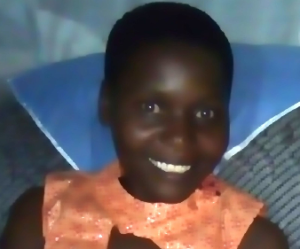
Our past Moving-on programme graduates are continuing well. Ester has been
working at a small private nursery however she has been offered a teaching job at
a Mennonite Primary School that has just opened. We hope this works out well
for her. We have spoken to her employer and are hopeful that this will be a good
move for her and advance her CV.
Kabula is still working for Busega Scotland as a secretary and general assistant. We
are impressed with her skills and work ethic. Her written English is very good now
and John is working with her on conversational English every day. We are hoping
she will get the opportunity to “fly the nest” soon and she is making a job application at the moment. I don’t know
how we will manage without her though.
Zabron continues working as a chef in a small but busy hotel. We have not managed to meet up as he is working long
hours.
Christine Carney
Busega Scotland
16.5.18

Tanzania Number 37 20.2.18
We would like to share with you the headline progress in our three projects and give you a flavour of what else has being going on. We would also like to thank Arnold and Valerie Barrow for their work in Tanzania over the last three weeks and for what they have been able to achieve. The couple are now safely home in Suffolk.
NEWS HEADLINES
Mains water reaches Mayega
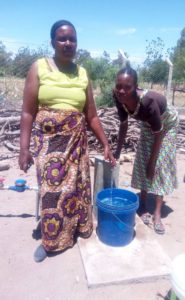 The absolute best news to come from Tanzania over the last year is that piped water has reached Mayega! There was a system installed in the seventies, but it had fallen into disrepair and pipes to Mayega were destroyed when the main road was constructed. Great credit must go to Busega District Council, water engineer Mohamed Yamlinga and Ernest Damiano, headteacher of Mayega Primary School. They have been the driving force behind the Mayega Water Group (MWG), that John has the honour of being Chairman.
The absolute best news to come from Tanzania over the last year is that piped water has reached Mayega! There was a system installed in the seventies, but it had fallen into disrepair and pipes to Mayega were destroyed when the main road was constructed. Great credit must go to Busega District Council, water engineer Mohamed Yamlinga and Ernest Damiano, headteacher of Mayega Primary School. They have been the driving force behind the Mayega Water Group (MWG), that John has the honour of being Chairman.
The council installed 5 km of mains pipes in January and volunteers Arnold and Valerie Barrow arranged, on behalf of Busega Scotland, connections and standpipes for the Children’s Centre and school. We have included the first picture of water flowing in the Centre and this is emotional for all who have worked so hard for this improvement in the lives of the children. No more trips to the lake and managing with buckets of dirty water. The next stage in exploiting the mains supply is Busega Scotland’s work with the MWG and the Rotary Club of Elgin. The Club is right behind plans for a two-phase project, to include the primary school, Children’s Centre and Mayega village.
Phase 1 – toilets for the primary school, and washing facilities and vegetable garden for the Centre.
Phase 2 – sanitation facilities for villagers and an associated health and hygiene education programme.
These are exciting times in Mayega and much progress has already been made.
Student numbers reach record high
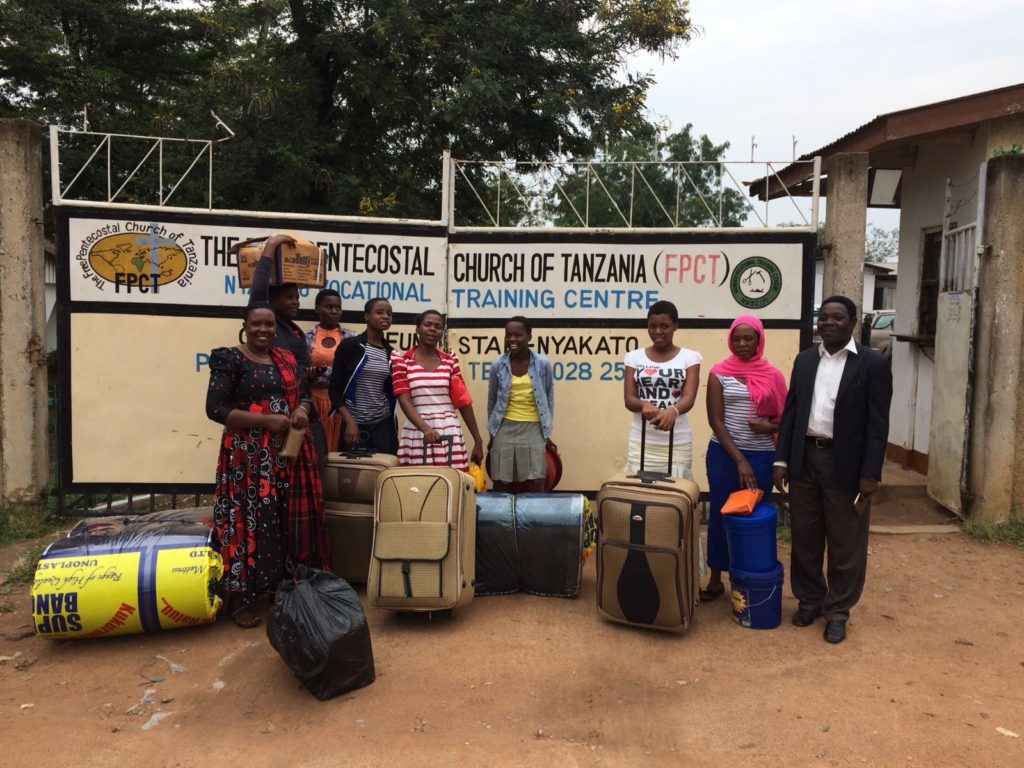
The number of young people who have left Mayega Children’s Centre and been supported through the Moving-on project has reached tw. Currently, we have seven students in their final year of motor mechanics and domestic electrical installation training, and one mechanic in his second year. Four girls, Christina, Happiness, Margaret and Tabu have just started at Nyakato College, studying tailoring and domestic electrical. Valerie and Arnold Barrow visited Nyakato on 14th February to see how the new students were settling in.
Twelve students in college at one time is a record for us. The purpose of the project is to provide educational, practical, social and emotional support for young people leaving the Centre and moving into independence, employment and adulthood. The need for the service is perhaps most starkly illustrated by 14 year old Christina.
In Tanzania, if pupils fail their Standard 7 examinations they leave the education system and do not progress to secondary school. This means public education is finished after primary school – no ifs, buts or maybes. This harsh reality became the fate of Christina, when her exam results were released at the end of last year. It is not appropriate for Christina to mark time at Mayega and so she has been welcomed into the Moving-on project, as our youngest ever Mayega leaver.
In full consultation with Christina, Mayega and Busega Scotland staff, a part time tailoring course at Nyakato College has been secured. She will live with Monica, Ester and Kabula, close to Rev Deuli’s family, so receiving the best possible day to day support. Busega Scotland will take its responsibilities towards Christina very seriously and she will remain within Moving-on for as long as is necessary. Already, Judy Campbell is working-up a small sewing project, allowing Christina to use her sewing skills to generate an income and provide business possibilities for the future. A sewing machine has been ordered from the British charity Tools for Self-Reliance.
Holy moly, new project at Chole!
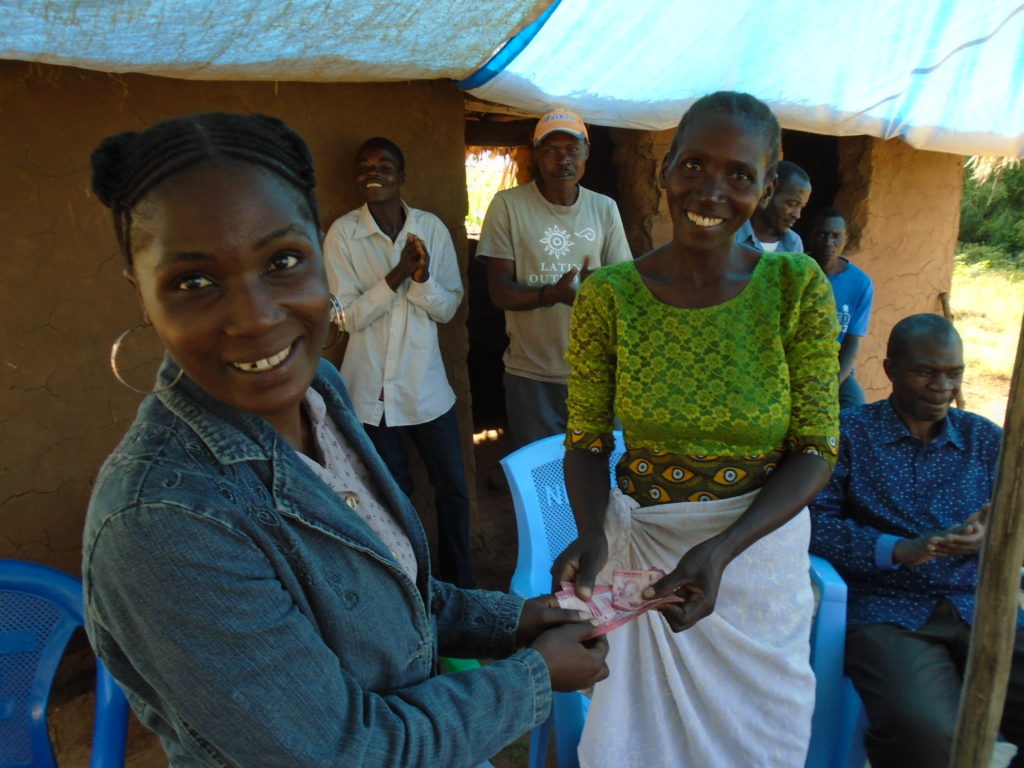
There was great fun and celebration in the village of Chole at the end of November. Chole is the site of our second Family Support Project, with two women’s groups involving 60 families. The first group received its final capital payment from Busega Scotland, into their vicoba or credit union. The women had been taking loans and paying into the fund for about 6 months and had increased the capital from about £230 to over £700. A real cause for celebration. Part of the increase came from the proceeds of the group garden, growing peppers, tomatoes and green vegetables.
The success of the first group has inspired a second group of women to come together and support each other. Again, a vicoba was set up and Busega had the honour of providing capital. Our partner Tanzania charity, CODEHDAF, donated horticultural implements and seeds. Chole is a very fertile area and being close to Lake Victoria there is the potential for year-round food production.
One of the successes of the Chole project is the health insurance scheme, negotiated on behalf of the women with Bukumbi Hospital. This is a Catholic mission hospital and for a yearly premium of £7 families receive all services free of charge, other than operations. In year 1 Busega Scotland pays the premium, in year 2 it is 50% CODEHDAF and 50% the women and after that the families will assume responsibility.
The real excitement of the afternoon celebration was Chole’s very own Goat Race. This was to recognise a grant made to the Family Support Project by the Goat Race charity in Dar es Salaam. As we didn’t know exactly what a Goat Race is, representatives from each Chole group chased a small herd of goats. The race ended when one goat was caught by the back leg through a full-length dive. An athletic action of grace and precision, suggesting goat racing should be an Olympic sport. Please note, no goats were harmed, and herd soon resumed its peaceful grazing.
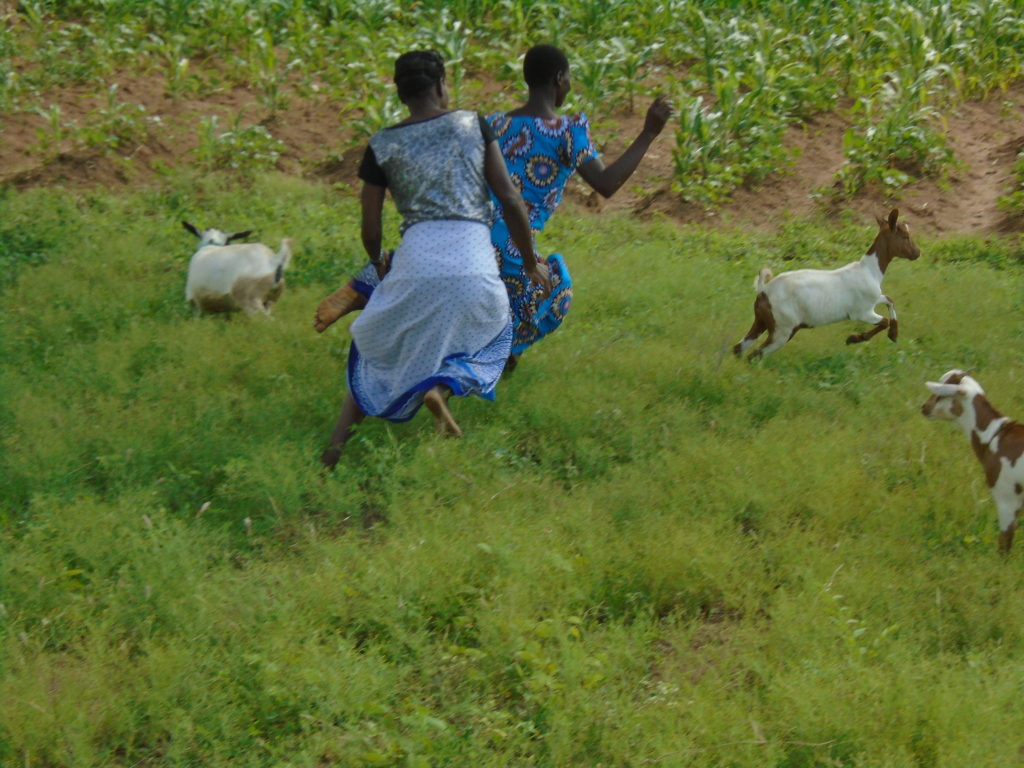
NEWS DIGEST
Mayega Children’s Centre
- Now that we have piped water, a piece of land 15 x 25m has been fenced as a vegetable garden. The land is poor but has been improved by chicken and cow manure and growing leguminous jack beans. The plan is to grow vegetables as a teaching garden for the children and villagers, as part of the Mayega Water Project. Well done to Ernest Damiano and Arnold Barrow, for successfully negotiating use of the plot with local government.
- A Mayega shuka has made a visit to its ‘birthplace’. The cloth was designed by the children at the Centre and produced by the historic Knockando Woolmill on Speyside in Moray. You will not believe how excited the children were to see what they’d help create! This is a unique project and an aspect of self-help that we are encouraging at the Centre. The shukas are expensive to buy – but they are beautiful and only 40 have been made – selling at £95 each. If you wish to purchase one, then the Carneys have some or go online to https://www.kwc.co.uk/ All profits go to Mayega Children’s Centre. The shuka is a forever memory of Mayega and the product of a very special collaboration.
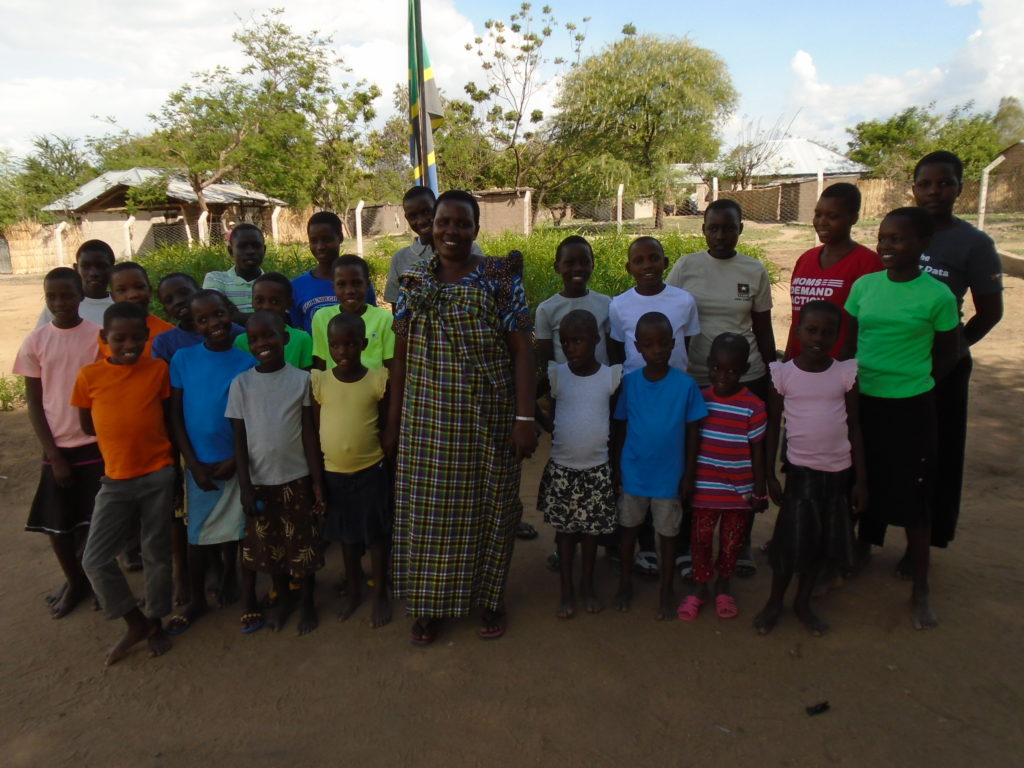
- Busega Scotland is employing a fifth member of staff at the Centre, Rose, as a relief cook. The extra post was a suggestion made by the Mayega staff team to allow existing colleagues time off for annual leave. When care staff (Leya and Peter) are on holiday Victoria (our main cook) will assume caring duties and Rose will take her place.
Moving-on
- Our first two graduates, Ester and Kabula, are now working as a kindergarten teacher and secretary. There is a vibrant private sector for pre-school education in Mwanza and Madame Ester has taken advantage of its opportunities. Kabula is on her third job since graduating. Her first was in an internet café but she was not paid (an all to familiar experience for young people in Tanzania), her second was as secretary to the bishop of he Charismatic Episcopal Church in Tanzania (as holiday cover) and now she is providing secretarial support in our staff office. Their success is an inspiration to the children being care for at Mayega.
Family Support
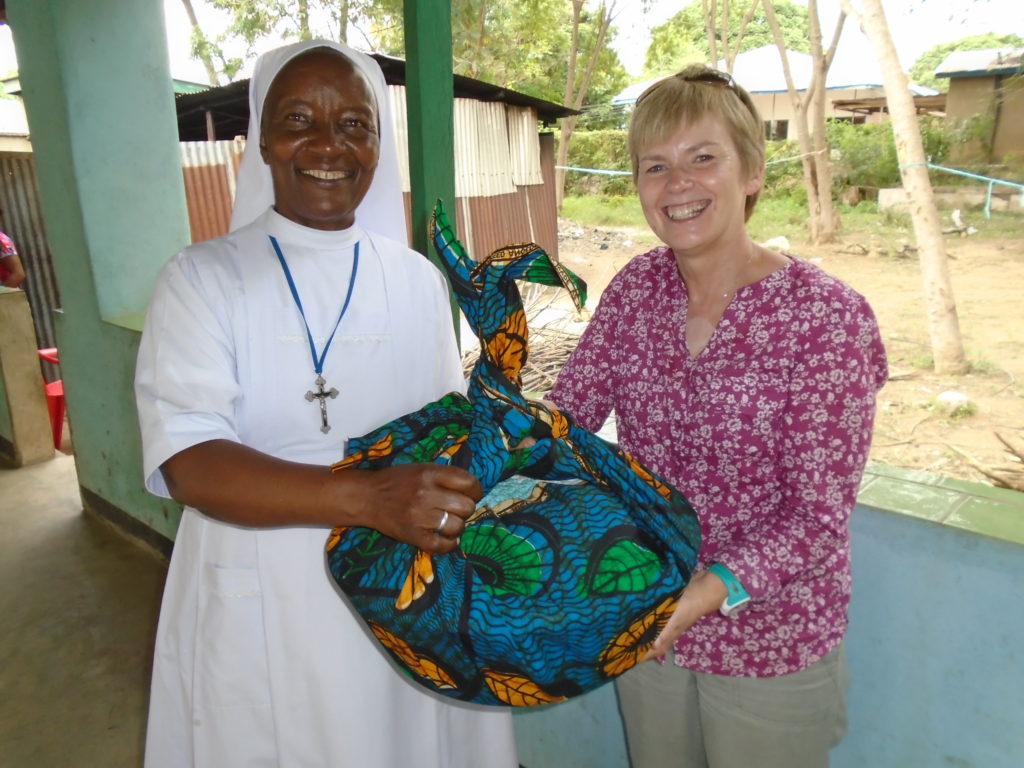
- Volunteer Judy Campbell has been taking forward a pilot project, called Baby Bundles, based at Bukumbi Hospital. The bundles are a variation on the Scottish baby boxes, but our bundles are delivered in in a small plastic basin and contain items for both mum and baby. The hospital identifies the poorest expectant mothers as recipients, and their delivery costs are also met by the project. This imaginative project is getting absolutely to the grassroots of Tanzanian society.
- A second women’s group has been established at Igombe, after the success of the Tushirikishane women who have gained recognition as a registered Community-based Organisation. There have been changes to the modus operandi, with lessons learned from the first group. The major change is an insistence that the women meet regularly
- and contribute to the vicoba. A review of Tushirikishane showed a correlation between business success and group participation, as vicoba loans can support families through difficult times and maintain business capital. All aspects of Busega Scotland’s work in Tanzania is a learning experience!
Fundraising News
- Pizza Aid is now international, as we have a participating restaurant in Edinburgh, one in Mwanza and a third to come on stream in Elgin in March. The concept is simple – the pizzeria contributes to Mayega Children’s Centre. from the sale of each nominated pizza. Kuleana in Mwanza and Toscana in Elgin have developed their own Pizza Mayega recipes and the Jolly in Edinburgh donates from the sale of each of its signature ‘Jolly Pizza’. We would welcome more participating restaurants – its easy, so please ask your favourite pizzeria if they would like to take part. They will be interested, and John and Christine will fully guide and support your initiative.
- Quiz Nights have also gone international. Not quite as exotic as Pizza Aid but nevertheless supporters and volunteers to Tanzania, Robin and Debbie Hill, are holding a quiz at the Leamington Irish Club on Saturday 7th April (there are full details on the Busega Scotland website). This is the first Quiz Night held outside Scotland and, again, if any supporters wish to emulate the efforts of the Hills. then full support will be given – including questions. Quiz Nights are fun and always well attended.
- Old Codgers (and friends) Birthday Walk! What on earth is this? Well, John Carney and Cenzo Main reach major personal milestones later this year. John is 65 on 23rd March and Cenzo is 60 on 30th March. What could be better than connecting the two birthdays with a sponsored walk for Busega Scotland? The lads are obviously too old for birthday presents! We are keen to encourage as many walkers as possible to take part (one day will be fine!). The route is over the iconic Speyside Way from 24th to 30th March. Full details from John at [email protected] or 07936 383800. Also, through the online donation page www.totalgiving.co.uk/mypage/oldcodgers Please support the walk if you can.
Data Protection Changes
- Secretary of Busega Scotland, Mike McClafferty, will be attending a course in Elgin on 26th February on General Data Protection Regulations (GDPR), that will affect UK charities and come into force on 25th May. The regulations will cover many issues and include the way in which we contact our supporters. Once Mike is up to speed, we will be making plans to implement GDPR within Busega Scotland and be back in touch with you. Many thanks to Mike for taking a lead on this important matter.
Personal Thanks
As Busega Scotland moves into its fourth year John and Christine would like to thank colleagues, supporters, volunteers and trustees for the work, generosity and commitment that has brought much needed support to many hard-pressed families and children in Tanzania. Busega Scotland tries to build resilience and independence through partnership and self-determination. The work is challenging but surely worthwhile.
John and Christine Carney
Tanzania Newsletter Number 36
17th August 2017
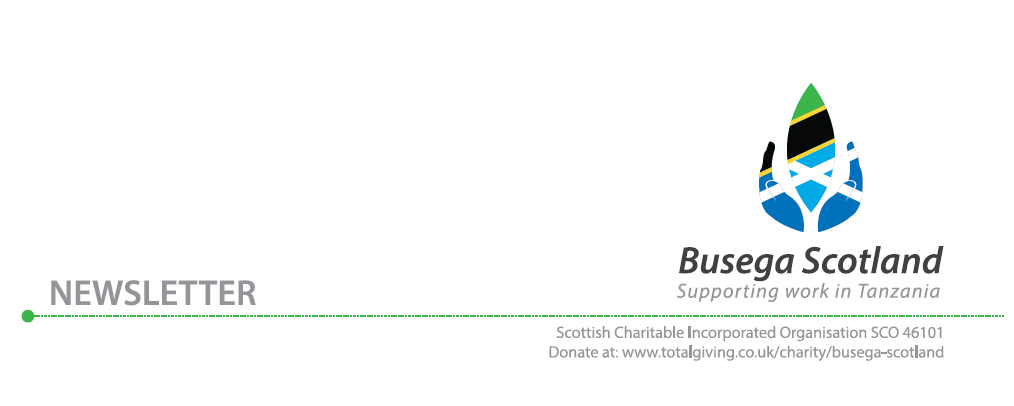
Moving –on Project News
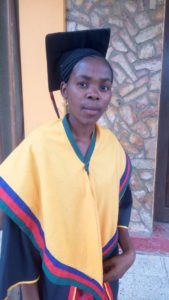
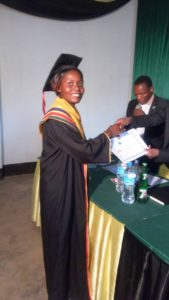
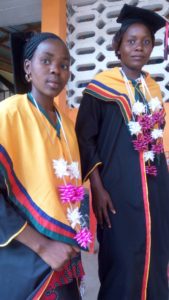
Three years of hard work have come to an end for Ester and Kabula who graduated on 11th August. They are now actively seeking employment. Ester is qualified as a primary and early year’s teacher. The main recruitment for teachers happens prior to the new school year opening in January but she is already circulating her CV to head teachers. Kabula is similarly visiting officesand businesses. She has trained as a secretary. Everyone at Busega Scotland wishes them well as they prepare to leave the Moving-on Project.
The girls are grateful for all the financial support they have received through Busega Scotland and in particular from the Anglican Church Basle, Living Links fund and individual supporters. Thanks also for donations from the “Wainhouse and the many people who have organised and attended fundraising events for them and the other 8 students of the Moving- on project.
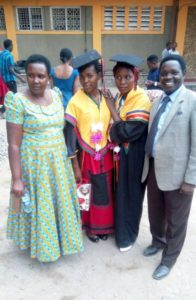 For now Matron and Rev Deuli are basking in the proud glow of surrogate “parents” to the two girls. Rev Deuli had a graduation of his own to attend a day later and his
For now Matron and Rev Deuli are basking in the proud glow of surrogate “parents” to the two girls. Rev Deuli had a graduation of his own to attend a day later and his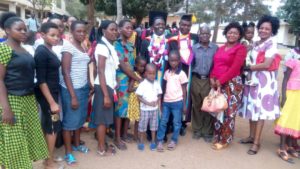 proud family and supporters looked on as he received his Master’s Degree in Divinity.
proud family and supporters looked on as he received his Master’s Degree in Divinity.
The 5 second year Kalwande mechanics students have returned to college after their 3 month placements in Mwanza garages. Lukondya, in first year, was pleased to have them back. The good news is that all the second years passed the national VETA (Vocational Education Training Association) exams, taken some months ago, allowing them to continue to Diploma level. Hasan represented the students at Ester and Kabula’s graduation ceremony. This was an inspiration for them all to work hard to achieve their dreams.
Monica and Masebuka, first year students at Nyakato College, are doing well and enhancing the reputation of Mayega Children’s Centre by the way they conduct themselves. They are polite and hardworking and their principal speaks highly of them.
Scotland
Thanks are due to Peter and Sandra Anderson who represented Busega
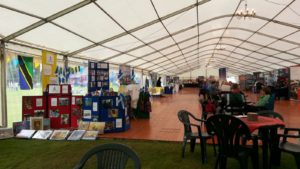
Scotland with John and Christine at both Refuel 17 and Keswick in Buckie Convention. Both these week long Christian events enabled Busega Scotland to forge links with other organisations and charities. Following the two events we have registered for payroll giving, have been offered ongoing advice from the Edinburgh Medical Missionary Society, and have a talk scheduled with the Skene Murray Mission. Christine also attended an Africa Night at St Margaret’s Church in Aberlour. Over the two weeks the Busega stall raised £485, with many thanks to Ruth McIntosh and friends for making the cloth bags that were on sale.
Mayega Children’s Centre News
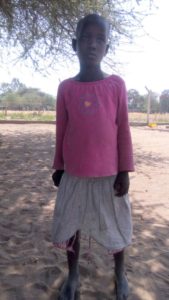 Every child living at Mayega has their own story to tell of how they found themselves living at a children’s home instead of with their biological families. The details are different but the common factor is overwhelming poverty. HIV and AIDS, fathers abandoning families, death or chronic sickness of a lone parent, all lead to situations where children become vulnerable. No strength to work the land/ poor rainy season/ no money for health care/ no money for food or school/ a community unable to care for its own. Often the children are reluctant to tell their personal story. Sometimes they have run away from a bad situation. They have a real fear that they could be sent back to the very place they have run away from.
Every child living at Mayega has their own story to tell of how they found themselves living at a children’s home instead of with their biological families. The details are different but the common factor is overwhelming poverty. HIV and AIDS, fathers abandoning families, death or chronic sickness of a lone parent, all lead to situations where children become vulnerable. No strength to work the land/ poor rainy season/ no money for health care/ no money for food or school/ a community unable to care for its own. Often the children are reluctant to tell their personal story. Sometimes they have run away from a bad situation. They have a real fear that they could be sent back to the very place they have run away from.
Last week we received a new child into the centre. Her name is Nkwabi and she says she is 8 years old. Nkwabi was found wandering lost and alone in the Serengeti National Park by some licensed hunters. She was unable to tell anyone the name of her village or where her family were. She was taken to the police station in the nearest town outside the national park gate, where she stayed for a few days while they made enquiries. She was then taken to the District Police Office in another town and again slept at the police station. With no progress in finding her family the District Welfare Officer asked the Children’s Centre to care for her. Nkwabi has never been to school and so does not speak Kiswahili, the unifying language taught in primary school. Fortunately, she speaks Kisukuma and so Leah, the Matron at Mayega, can communicate with her. More than two weeks have passed since she was found. We hope that someone will go to the police and report her missing. Perhaps Nkwabi has a story to tell but it may take some time before she is able to tell it.
She is the 22nd child currently being supported at Mayega Children’s Centre. Like all the new arrivals, Nkwabi had only the clothes she was wearing. The other children are welcoming her and helping her feel safe and secure. Her future is uncertain but soon we will look at school enrolment.
Bats
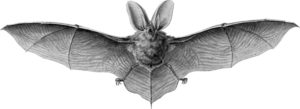
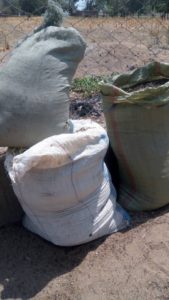 The solar system in the dormitories has been repaired again after a large colony of bats in the roof space ate through the wires and fittings. The bats were removed and extensive work was carried out to secure the roof space from further invasion.Every cloud has a silver lining. I don’t know how many bats were in the roof but they produced a lot of droppings, which will provide fertiliser for the new vegetable garden. It’s too hot and dry to go on the land at the moment but work started a few months ago improve the soil. Bats are not protected in Tanzania. Nonetheless, we decide to remove them rather than exterminate them.
The solar system in the dormitories has been repaired again after a large colony of bats in the roof space ate through the wires and fittings. The bats were removed and extensive work was carried out to secure the roof space from further invasion.Every cloud has a silver lining. I don’t know how many bats were in the roof but they produced a lot of droppings, which will provide fertiliser for the new vegetable garden. It’s too hot and dry to go on the land at the moment but work started a few months ago improve the soil. Bats are not protected in Tanzania. Nonetheless, we decide to remove them rather than exterminate them.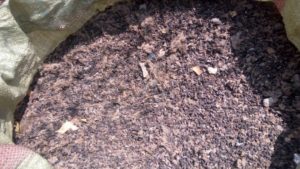
Tanzanian Journeys
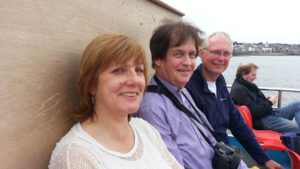 Bon Voyage! Volunteers Robin and Debbie Hill are on route to Tanzania today. We have just heard that they arrived safely in Kigali, Rwanda this morning from wherethey will get a connecting flight to Tanzania.
Bon Voyage! Volunteers Robin and Debbie Hill are on route to Tanzania today. We have just heard that they arrived safely in Kigali, Rwanda this morning from wherethey will get a connecting flight to Tanzania.
They were last in Mwanza in 2014 and so will see many changes in the projects and in the city of Mwanza itself. The road from the airport is being upgraded to dual carriageway and the Chinesebuilt shopping mall which, was a building site in 2014, is now open although few can afford to shop there.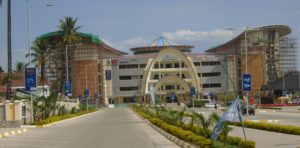
Robin and Debbie will be visiting Mayega Primary School and taking gifts of sporting equipment from Lhanbryde Primary School in Moray. They are carrying netball, volleyball, and football equipment. It is possible to buy balls in Tanzania but they are very expensive and we have only found poor quality ones in the past. Let’s hope the Hills have no problem at customs! We look forward to all Robin and Debbie’s news and pictures, which will be posted on the website.
 All Busega Scotland volunteers are self-funding and no donations given to Busega Scotland are used to support them. Busega Scotland also receives specific donations to cover fundraising costs (hire of venues etc) meaning that people can be confident that their donations reach Tanzania. A recent addition to our website is an accounts page, which has a summary of our annual income and expenditure. It can be viewed here. https://busegascotland.co.uk/annual-accounts/ Of course information on our accounts is also available on the OSCR Website https://www.oscr.org.uk/charities/search-scottish-charity-register/charitydetails?number=SC046101#resul
All Busega Scotland volunteers are self-funding and no donations given to Busega Scotland are used to support them. Busega Scotland also receives specific donations to cover fundraising costs (hire of venues etc) meaning that people can be confident that their donations reach Tanzania. A recent addition to our website is an accounts page, which has a summary of our annual income and expenditure. It can be viewed here. https://busegascotland.co.uk/annual-accounts/ Of course information on our accounts is also available on the OSCR Website https://www.oscr.org.uk/charities/search-scottish-charity-register/charitydetails?number=SC046101#resul
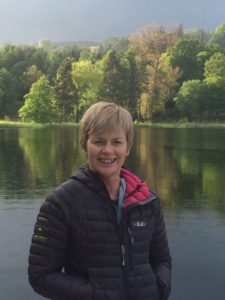 Judy Campbell, a new volunteer with Busega Scotland, is preparing for a six month stint in Tanzania starting in October. This will be her first trip to Africa and she is very excited about the work ahead. She will be spending most of her time with Shaloom Care House, a Catholic project supporting adults, parents and children affected by HIV and AIDS. Although the prevalence of AIDS is dropping there are large numbers of families still impacted by the infection and Shaloom provides medical, nursing and social care to many people. For example, in the children and youth project there are 400 regular attenders! Judy is volunteering as a social worker in the project using all her transferrable skills after many years in nursing. If the work at Shaloom isn’t enough she will be helping to establish a project with Busega Scotland, in the rural village of Chole. We will be piloting a preventative health programme in partnership with the local mission hospital, to improve the health status of very poor families within the community. Both Shaloom Care House and the Chole Family Support Project need funds to carry out their extremely important work. If you would like to support Judy’s work in these projects you can make a donation through her total giving page at https://www.totalgiving.co.uk/mypage/judycampbell
Judy Campbell, a new volunteer with Busega Scotland, is preparing for a six month stint in Tanzania starting in October. This will be her first trip to Africa and she is very excited about the work ahead. She will be spending most of her time with Shaloom Care House, a Catholic project supporting adults, parents and children affected by HIV and AIDS. Although the prevalence of AIDS is dropping there are large numbers of families still impacted by the infection and Shaloom provides medical, nursing and social care to many people. For example, in the children and youth project there are 400 regular attenders! Judy is volunteering as a social worker in the project using all her transferrable skills after many years in nursing. If the work at Shaloom isn’t enough she will be helping to establish a project with Busega Scotland, in the rural village of Chole. We will be piloting a preventative health programme in partnership with the local mission hospital, to improve the health status of very poor families within the community. Both Shaloom Care House and the Chole Family Support Project need funds to carry out their extremely important work. If you would like to support Judy’s work in these projects you can make a donation through her total giving page at https://www.totalgiving.co.uk/mypage/judycampbell
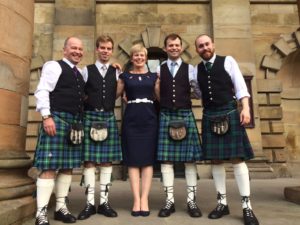 Everyone was wearing their glad rags on 11th August, Ester and Kabula at their graduation and Judy with husband Ian and sons Stuart, Lewis and Ian at a family wedding. We thank Judy’s family for sharing her with Busega Scotland for six months and for her congregation at Lossiemouth Baptist Church for all their encouragement.
Everyone was wearing their glad rags on 11th August, Ester and Kabula at their graduation and Judy with husband Ian and sons Stuart, Lewis and Ian at a family wedding. We thank Judy’s family for sharing her with Busega Scotland for six months and for her congregation at Lossiemouth Baptist Church for all their encouragement.
Family Support Project News
Sustainability, sustainability, sustainability! Just as Tony Blair insisted his government was about ‘education, education, education’ and Bill Clinton said, in winning the 1992 election, ‘it is the economy, stupid’, the word sustainability runs through the Family Support Project, like Blackpool through Blackpool Rock. The challenge for poor families in Tanzania is enormous, and probably greater than we could ever imagine, with the ‘solution’ way beyond the scope of Busega Scotland. But we do what we can and the women in the Family Support Project do the rest. We have successes to share with you. The first women’s group in Igombe is now self-financing and autonomous. The window has been opened and it has flown away! 89% of the women surveyed said that their businesses (established with the help of Busega Scotland) were ‘Good’ or ‘OK’. The importance of the women coming together cannot be overstated, in helping
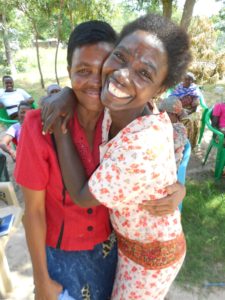 each other through difficult times. At a personal level, Margreth Masaga, the inspiration for the project back in 2014, has been able to buy a piece of land and is constructing a house for her family. How good is that? Over at Chole the news is also good. The upmarket Goat Race charity in Dar es Salaam has awarded our project a grant to start a second group of 35 families. We think the charity was impressed by progress with the first group, where the women (like in Igombe) have established a well-run vicoba or credit union. This is a savings scheme, were some business profits are deposited and used for the women to then take loans. This is self-help and sustainability personified.
each other through difficult times. At a personal level, Margreth Masaga, the inspiration for the project back in 2014, has been able to buy a piece of land and is constructing a house for her family. How good is that? Over at Chole the news is also good. The upmarket Goat Race charity in Dar es Salaam has awarded our project a grant to start a second group of 35 families. We think the charity was impressed by progress with the first group, where the women (like in Igombe) have established a well-run vicoba or credit union. This is a savings scheme, were some business profits are deposited and used for the women to then take loans. This is self-help and sustainability personified.
Looking ahead there is still much to do. Judy Campbell will be working at Bukumbi Hospital with Sr Anastasia and Henry Zepherin to help establish a preventative health programme and will use Swahili DVDs sourced by Robin and Debbie Hill. In Igombe, Busega Scotland colleagues, Alphonce Kagezi and Julieth Godwin, are establishing a second women’s group. So, the message is loud and clear. People working together from different backgrounds, cultures and countries can do so much by sharing their experiences, knowledge and skills, in a spirit of ‘co-operation, co-operation, co-operation’!
Nzuri sana!
Yes, the Mayega shuka is ‘very beautiful’ and somehow captures exactly what Busega Scotland is all about. The back story is amazing. One of our trustees, Colin Sanders, has links to a heritage trust operating in the valley in which John and Christine live – the Spey valley. The trust operates a mill at Knockando, which has been producing woollen cloth since 1784. InTanzania, one its iconic tribes, the Maasai, wear a cloak, called a shuka, that may well have connections to early Scottish missionaries/settlers, given its tartan design.
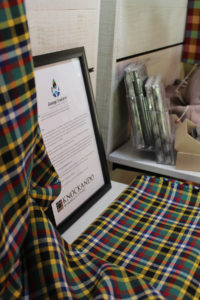 So, what did Busega Scotland do? We linked this all up. The mill provided templates that we took to Mayega. The children coloured them in, using colours familiar in their environment. The artwork came back to Scotland and the unique Mayega shuka was born. Forty shukas have been produced and they are onsale through the Knockando Wool Mill shop and online. We think these are the onlywoollen shukas produced worldwide and are certainly the only ones designed through the imagination of children in Mayega. John and Christine will be going back to Tanzania later in the year and cannot wait to show the children what they have helped to produce.Within that there are important messages. The children do have worth, theycan be part of the wider world and as adults we should say what we’ll do and do what we say. This all brings hope for the future.
So, what did Busega Scotland do? We linked this all up. The mill provided templates that we took to Mayega. The children coloured them in, using colours familiar in their environment. The artwork came back to Scotland and the unique Mayega shuka was born. Forty shukas have been produced and they are onsale through the Knockando Wool Mill shop and online. We think these are the onlywoollen shukas produced worldwide and are certainly the only ones designed through the imagination of children in Mayega. John and Christine will be going back to Tanzania later in the year and cannot wait to show the children what they have helped to produce.Within that there are important messages. The children do have worth, theycan be part of the wider world and as adults we should say what we’ll do and do what we say. This all brings hope for the future.
If you would like to know more about the shukas, see some excellent photographs or even buy one, then please use the following link https://www.knockandowoolmill.co.uk/search?type=article&q=busega
ll profits will go to Mayega Children’s Centre. Selling the shukas is important in supporting the centre but also for developing self-esteem, in showing thechildren how other people value what they have helped to achieve. The shuka can be used as blanket, table cloth, picnic blanket, shawl, throw or in the car.
Last but not least!
We are always on the lookout for second hand laptops for our students and staffin Tanzania. Ideally, we are looking for systems running Windows 7 as a minimum. We have help from MJD Systems at Spey Bay in wiping the computers and getting them ready for a new use. If you have a machine looking for a new lease of life in Africa, please contact us. Reuse is better than recycle!
With all Good Wishes
John and Christine Carney
————————————————————————————-

Newsletter 35
Busega Scotland Moving On Project Report May 2017
Kalwande Mechanic Students- Enosi, Dotto, Lukondya, Geoffrey, George, Hasan

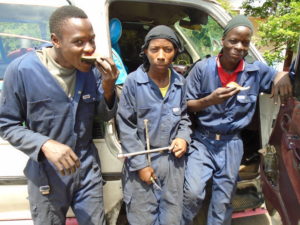 George, Geoffrey and Dotto are enjoying their placement in a small garage on Airport Road at Bwiru Corner. This is the main thoroughfare into Mwanza. The second year Kalwande mechanic students are gaining valuable experience and are very happy that the garage owner believes that he gets the best out of the staff if he feeds them well! The boys are provided with lunch and snacks every day. I think they earn it! It is hard hot work. This is a typical garage with the boys working out in the open. No shelter from the sun or rain and thankfully it has been raining. Most of the work is on the minibuses a
George, Geoffrey and Dotto are enjoying their placement in a small garage on Airport Road at Bwiru Corner. This is the main thoroughfare into Mwanza. The second year Kalwande mechanic students are gaining valuable experience and are very happy that the garage owner believes that he gets the best out of the staff if he feeds them well! The boys are provided with lunch and snacks every day. I think they earn it! It is hard hot work. This is a typical garage with the boys working out in the open. No shelter from the sun or rain and thankfully it has been raining. Most of the work is on the minibuses a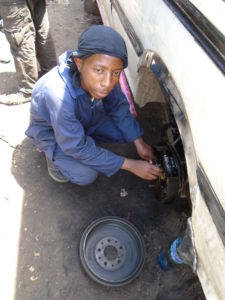 nd motorbike taxis which are plentiful in the city.
nd motorbike taxis which are plentiful in the city.
Hasan and Enosi are also busy working. Enosi is at the larger Nile Perch garage on the outskirts of town. Nile Perch is a fish processing firm with a garage to keep its fleet of vehicles maintained. He is enjoying the experience but like Hasan does not have the added perk of free food! Hasan is working with the Mwanza water authority maintaining its vehicles.
These placements are an important part of their diploma qualification, as the 5 students will receive marks which will count towards the final national exams next year.
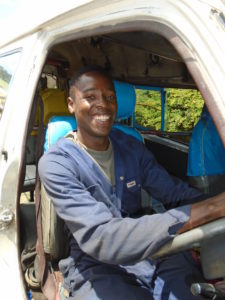
Lukondya remains at college. He is one of 34 first year students in the mechanics class at Kalwande. All six boys are working towards a diploma qualification which takes three years to complete. Busega Scotland is supporting them through fundraising events and donations.
Thankfully we have received support from the Stowmarket Salvation Army Corps in providing tools for the students and the Anglican Church Basle which is funding their placement expenses. We have rented accommodation in Mwanza for three months so that the students can get to work. They are sharing one large room. It is very basic and had no electricity at first but now they at least have lighting. It is too far and too expensive to travel from college every day. Kalwande is a rural college and so the boys are experiencing city life for the first time. They have to buy food and cook for themselves which is a new experience. At college food is provided for them. All this will help equip them for the future.
Rev Deuli, Busega Scotland’s Project Leader, is in daily contact with the boys who are living close to his home. George was recently sick with malaria but help was at hand to get him seen by a doctor and treatment started. There is a lot of malaria in the Lake Zone. The boys sleep under mosquito nets but as most of life takes place outdoors they can be bitten at any time.
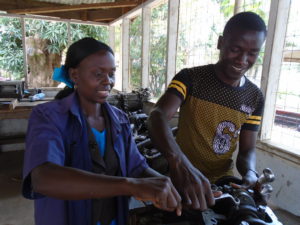 Masebuka is our 7th mechanics student but he is studying at Nyakato Vocational training Centre. He is on a two year certificate course. The college is relatively well equipped with workshops for carpentry, welding, plumbing, electrical and tailoring. The college used to receive support from Finland but is now self-funding and is run by the Free Pentecostal Church of Tanzania. The principal says they cannot make ends meet on student fees alone so they have a number of social enterprises. One of these is vehicle maintenance. This allows the students ongoing practical experience. When we visited in April they were working on a school bus and a minibus. Masebuka is a bright student with lots of potential. He came 2nd out of 86 first year students in his first term exams.
Masebuka is our 7th mechanics student but he is studying at Nyakato Vocational training Centre. He is on a two year certificate course. The college is relatively well equipped with workshops for carpentry, welding, plumbing, electrical and tailoring. The college used to receive support from Finland but is now self-funding and is run by the Free Pentecostal Church of Tanzania. The principal says they cannot make ends meet on student fees alone so they have a number of social enterprises. One of these is vehicle maintenance. This allows the students ongoing practical experience. When we visited in April they were working on a school bus and a minibus. Masebuka is a bright student with lots of potential. He came 2nd out of 86 first year students in his first term exams.
The college is unusual in that it has a number of female technical teachers. Monica is another Mayega Children’s Centre student in her first year there.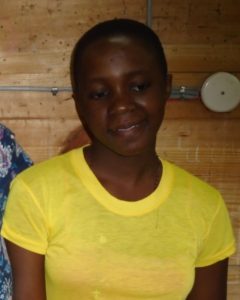
She is studying electrical installation and also has a female tutor. Monica is one of 4 girls in a class of 35 students. When we visited it was sports on the timetable and we were happy to find Monica playing volleyball. She is a shy girl and it was good to see her mixing with the other first year girls. Monica also did well in her first term exams and staff reported that she was working hard and doing well.
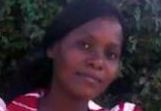 Ester, our 3rd year teaching student, is also on placement at the moment. She is working at Nyamanoro Baptist English Medium Pre & Primary School. This is a large private school in Mwanza. Rev Deuli was able to secure her placement due to his local contacts. The headmaster, Mr Martine Masele said that he was happy to offer Ester teaching practice as she was recommended by Rev Deuli’s friend, the Baptist pastor.
Ester, our 3rd year teaching student, is also on placement at the moment. She is working at Nyamanoro Baptist English Medium Pre & Primary School. This is a large private school in Mwanza. Rev Deuli was able to secure her placement due to his local contacts. The headmaster, Mr Martine Masele said that he was happy to offer Ester teaching practice as she was recommended by Rev Deuli’s friend, the Baptist pastor.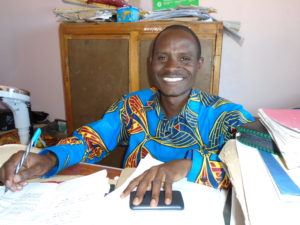
The placement is due to be completed on 21st July. Just as with the boys the placement marks will form part of her final qualification grade. Ester has already sat her exams and so this is the last part of her course. No-one is sure when the exam results will be published but graduation preparations have already started!
Last but not least is Kabula.
She finished her secretarial course placement on 19th May.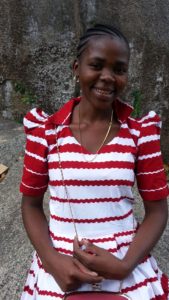 She was working in the education offices of the district council. She received a very positive report on her work. The person she was working with was sick for a couple of weeks and Kabula had to ‘hold the fort’. She was dealing with local headmasters, solving their problems and directing them to complete any necessary paperwork.
She was working in the education offices of the district council. She received a very positive report on her work. The person she was working with was sick for a couple of weeks and Kabula had to ‘hold the fort’. She was dealing with local headmasters, solving their problems and directing them to complete any necessary paperwork.
She was proud to do the job well and received many compliments on her performance.
Just like Ester she now has to wait for the results of the national VETA exams. Meanwhile, she has been taking her CV to different places and Busega Scotland staff are using all their contacts to try to help her. Getting a job in Tanzania requires a lot of work. Positions are generally not advertised and job seekers must go around visiting as many places as possible. Who you or your family know is really important. For a young person from an orphanage this makes life difficult but she is now a confident young woman. We hope her drive and enthusiasm will open doors for her.
At Mayega there are three girls due to sit their Form 4 school leaving exams in October. Happiness, Margaret and Tabu have fortnightly life skills discussions with Julieth Godwin, Busega Scotland’s Assistant Project Leader. The programme aims to prepare them for life outside institutional care. The only life they have known is in a rural village where there are well defined traditional female roles. We are trying to help the girls identify realistic options for their future. They will leave as young women. The path from orphanage child to young adult is not easy but the Moving-on Project will be with them along the way.
If you would like to support any of the young people through a one off donation, fundraising event or individual sponsorship please email Christine at [email protected]
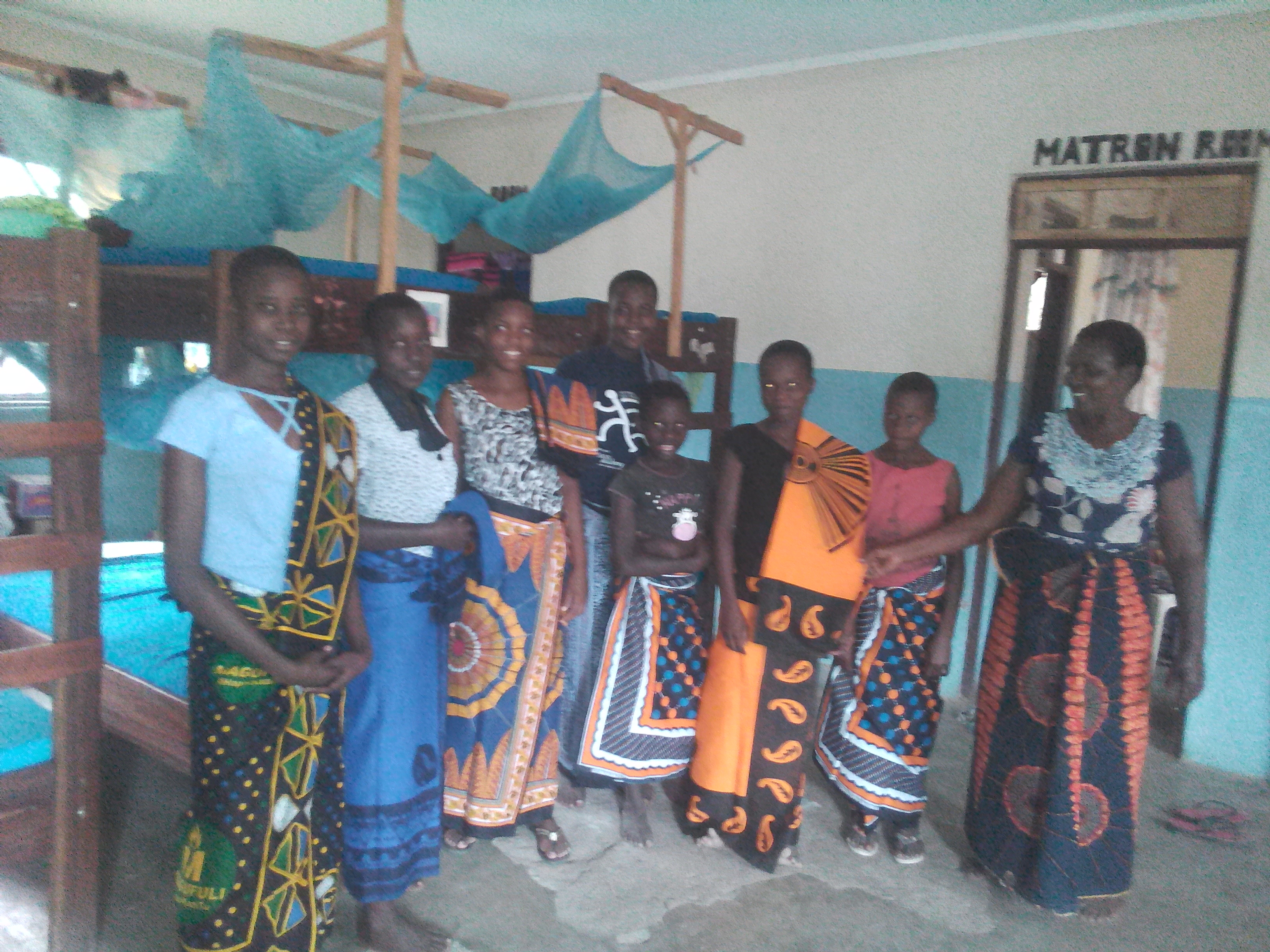
Mayega’s older girls wearing their traditional kangas. These are worn by girls over the age of about 10.

Newsletter 34
15th May 2017
Family Support Project Report
Important planning has taken place in Mwanza to chart the course of the Busega Scotland Family Support Projects (FSP) at Igombe and Chole. The two projects have important differences, and are at different stages of their development.
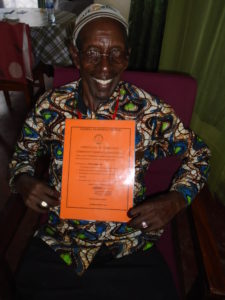
The great news from Igombe is that the FSP Tushirikishane Women’s Group is now a Community Based Organisation (CBO), registered with Ilemela Municipal Council.
The registration is a lengthy process, and cost the group about £100 to achieve, but it allows them to open a bank account and have the possibility for local and central government support. In its constitution the group has 25 founder members but the number will increase as other members join (at present the Family Support Project has provided grants to over 40 families). Going forward the group would like to develop a training plan and maybe start some co-operative businesses, to boost incomes. Alphonce Kagezi, Busega Scotland FSP Supervisor in Igombe, said,
‘I would like to thank Busega Scotland for the help it provides to the poor families. It may seem only small amounts but it helps families overcome other problems in their lives, and in the bible it says, it is always better to give than to receive!’
Busega Scotland is trying to avoid a ‘glass ceiling’ for families in the FSP and help them towards greater financial security. As Mr Kagezi implies, we provide an opportunity that the women have to grasp, but this is not at all easy and is fraught with difficulties. Life for the women in Igombe is, by any measure, hard and uncertain.
We have been speaking to Mr Kagezi about the women who are not in the women’s group and the reasons for that. Our Assistant Project Leader, Julieth Godwin, has also been doing some research into the issue with the women themselves. It is vitally important that group support is available to everyone, as this helps families get over hard times as loans can be made from group funds. The alternative is that women have to use business capital and that can be disastrous. As a result of Julieth’s research some important changes may be made to the project, so that it is strengthened in the light of experience. Busega Scotland is committed to continuously improving its services and challenges arise and have to be overcome on a daily basis.
The project at Chole got off the ground at just the end of last year. It is partnership between a Tanzanian NGO called CODEHDAF, the Chole Women’s Group, Bukumbi Hospital and Busega Scotland. The Chole group is already a registered CBO, with 28 families, and CODEHAF provides inputs for horticultural projects. We will be providing capital for the group of about £375 in total. This allows the women to provide loans to each other as they grow individual businesses. Our second commitment is to provide health insurance for each family for one year, while the families save for subsequent years. We have negotiated a comprehensive service with the local mission hospital at Bukumbi.

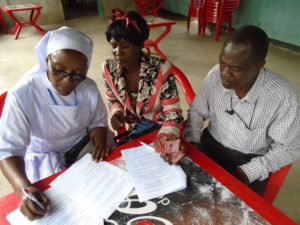 The hospital is one of the oldest in the Lake Zone, having been established by Catholic missionaries in the early 1900’s. It has 150 beds serving 25,000 to 30,000 patients per year.
The hospital is one of the oldest in the Lake Zone, having been established by Catholic missionaries in the early 1900’s. It has 150 beds serving 25,000 to 30,000 patients per year.
The insurance, for all services except operations, is costing £7.50 per family per year. In the second year CODEHDAF will pay half the premium and the women the other half, and from the third year onwards the women will become liable for the full costs.
When representatives of the Chole Planning Team, Julieth Godwin and Henry Zepherin (CODEHDAF Field Officer), met the Chole Women’s Group the ladies were delighted with what had been negotiated on their behalf. A project agreement has been signed, with Sister Anastasia Salla the signatory for the hospital.
Julieth has also checked the Chole group’s finances and record keeping. The books are well kept and this has allowed Busega Scotland to pay a second instalment into the group’s capital. The women use the fund as a savings scheme for themselves, as well as taking loans from it. The fund’s total has now reached over 1,000,000/- (£380) and there is still one more Busega Scotland payment to be made.
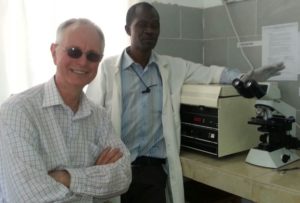 Henry is also the Laboratory Technician at Bukumbi Hospital, having worked there for 25 years. He has strongly advocated community health promotion in Chole, linked to the health insurance scheme. Busega Scotland is planning to work with the hospital in developing the idea, which may include health education, testing and treatment. As Henry said, ‘if the Chole families are tested I am sure that many people will be anaemic through infections with bilharzia, intestinal worms and amoebiasis’. These infections are endemic along the shores of Lake Victoria, can be debilitating to the population and we haven’t even mentioned malaria and HIV!
Henry is also the Laboratory Technician at Bukumbi Hospital, having worked there for 25 years. He has strongly advocated community health promotion in Chole, linked to the health insurance scheme. Busega Scotland is planning to work with the hospital in developing the idea, which may include health education, testing and treatment. As Henry said, ‘if the Chole families are tested I am sure that many people will be anaemic through infections with bilharzia, intestinal worms and amoebiasis’. These infections are endemic along the shores of Lake Victoria, can be debilitating to the population and we haven’t even mentioned malaria and HIV!
If the Chole project is to work to best effect then the women have to healthy to be productive. This is a self-evident but harsh reality of life. It is why Busega Scotland adopts a holistic approach to its projects, while trying to be helpful in a sustainable manner.
If you want to know more about the Busega Scotland Family Support Project, or think you can help in any way, please contact us on [email protected] .
